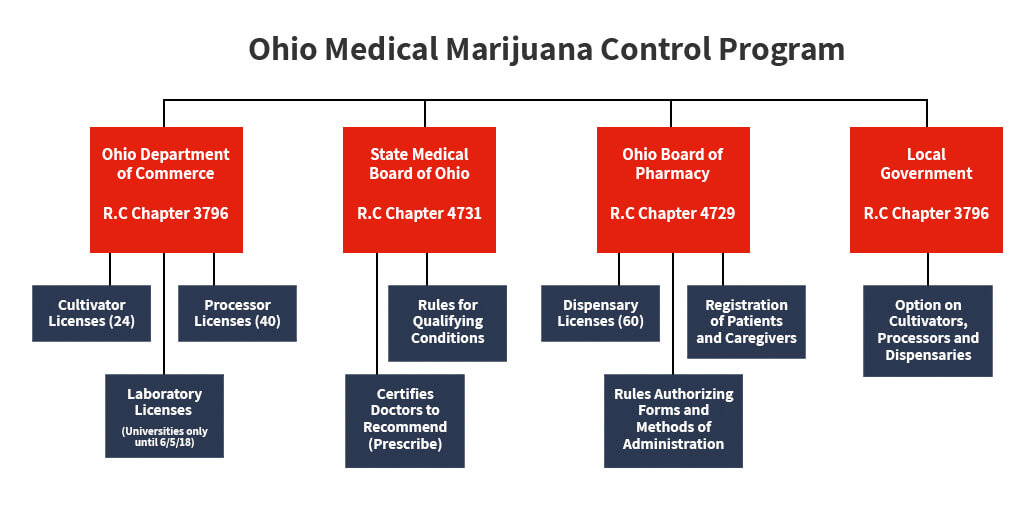Ohio Medical Marijuana Control Program
< Back to Ohio Professional Licensure Defense
On June 8, 2016, Governor John Kasich signed Sub House Bill 523, making Ohio the 25th state to legalize marijuana for medicinal purposes. The new law makes it legal for patients with certain medical conditions, with recommendation of an Ohio State Medical Board licensed and certified physician, to purchase and use medical marijuana. Recreational use of marijuana is still a criminal violation.
If you have questions about the Ohio Medical Marijuana Control Program or how your medical license may be impacted by the new law, contact Graff & McGovern today at 614-228-5800, or use our online form, to schedule an appointment with one of our attorneys.
Medical Marijuana Regulation in Ohio
The Medical Marijuana Control Program is regulated by the Ohio Department of Commerce and the State of Ohio Board of Pharmacy. The Department of Commerce will provide for the licensure of medical marijuana cultivators and processors and the laboratories that test medical marijuana. The Board of Pharmacy will provide for the licensure of retail dispensaries, the form and substance of the medical marijuana that will be dispensed, and the registration of patients and their caregivers. The State Medical Board of Ohio will play a part as well. The Medical Board will authorize MD’s and DO’s to recommend a patient use medical marijuana.

Who Can Use Medical Marijuana?
In order to use medical marijuana legally, you must have a medical marijuana patient ID card, or an affirmative defense card. Cards will be issued by the State of Ohio Board of Pharmacy beginning no later than September 2018. In order to obtain an ID card, you must have a recommendation to use medical marijuana from a licensed and certified physician.
According to Ohio law, you must have one of the following conditions in order to qualify for legal use of medical marijuana:
- Amyotrophic lateral sclerosis
- Alzheimer’s disease
- Cancer
- Chronic traumatic encephalopathy
- Crohn’s disease
- Epilepsy or another seizure disorder
- Fibromyalgia
- Glaucoma
- Hepatitis C
- Inflammatory bowel disease
- Multiple sclerosis
- Pain that is either chronic and severe or intractable
- Parkinson’s disease
- PTSD
- Sickle cell anemia
- Spinal cord disease or injury
- Tourette’s syndrome
- Traumatic brain injury
- Ulcerative colitis
Minors may be able to use medical marijuana with the recommendation of a certified physician, who must obtain consent for treatment from a parent or guardian.
Medical Marijuana Businesses
Although the Ohio Medical Marijuana Control Program will not be fully operational until September 8, 2018, all rules must be adopted by September 8, 2017.
Licenses will be issued for medical marijuana businesses in Ohio for the following categories:
- Cultivators – As of July 1, 2017, only the cultivator rules have been promulgated. There are two types of cultivators. Those who will cultivate up to 3,000 square feet (Level I), and those who will cultivate up to 25,000 square feet (Level II). Only twelve of each license will be granted by September 8, 2018.
- Processing Facilities – Processors will take marijuana from a cultivator and process it into an approved form: oils, tinctures, edibles, or patches. There should be forty medical marijuana processors by September 8, 2018.
- Testing Facilities – Laboratories will test the marijuana from the cultivator’s and processor’s facilities. The THC content of the products must not be greater than 35 percent.
- Dispensaries – Dispensaries are the only place a patient can obtain medical marijuana. Personal use cultivation is not permitted. There is expected to be 60 dispensaries spread throughout the state by September 8, 2017. The dispensary will provide medical marijuana to patients that are in the Board of Pharmacy’s database.
This will be a heavily regulated industry. As a result, all employees of medical marijuana businesses will be required to obtain licenses and pass criminal background checks. These license requests can be denied for a number of reasons.
Contact Graff & McGovern Today
Doctors who recommend that their patients use medical marijuana can face complex issues with federal and state licensing. Medical marijuana businesses must navigate an array of rules and licensing requirements. If you have questions about the Ohio Medical Marijuana Control Program, contact Graff & McGovern at 614-228-5800, or use our online form, to speak with an attorney today.

